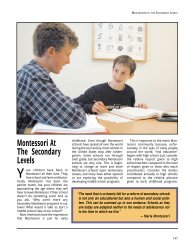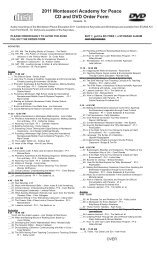Tim Seldin & Paul Epstein Ph.D. An Education for Life
Tim Seldin & Paul Epstein Ph.D. An Education for Life
Tim Seldin & Paul Epstein Ph.D. An Education for Life
Create successful ePaper yourself
Turn your PDF publications into a flip-book with our unique Google optimized e-Paper software.
The Montessori Way<br />
Dr. Maria Montessori carried a<br />
large vision <strong>for</strong> the purpose of<br />
education — the establishment<br />
of universal and lasting peace.<br />
Although she witnessed two world<br />
wars and the unleashing of nuclear<br />
power, Montessori evolved a living<br />
philosophy of education, child-study<br />
methods, age-appropriate curricula<br />
and instruction, and programs <strong>for</strong><br />
adult teacher education. In 1940, she<br />
wrote:<br />
“Man masters almost everything but<br />
himself. He knows almost everything but<br />
himself. He avails himself of the most hidden<br />
treasures but does not use the<br />
immense riches and powers that lie within<br />
himself.<br />
This points to the great and urgent task of<br />
education! No mobilization is as complete<br />
as that which can be realized by the<br />
school. In the past, military service was<br />
limited to men of a certain age group.<br />
Now more and more people are drawn<br />
into the service of war — even women<br />
and children.<br />
But if the school takes upon itself the task<br />
of mobilizing the young <strong>for</strong> the achievement<br />
of that perfect development that<br />
brings <strong>for</strong>ward man as he can and is destined<br />
to be: conscious of the society he<br />
will become part of; master, not slave, of<br />
the infinite means that civilization puts<br />
at his disposal; equally developed in his<br />
moral and social powers as in his physical<br />
and intellectual ones; aware of his<br />
task, which requires the collaboration<br />
and unanimous ef<strong>for</strong>t of the whole of<br />
mankind—nobody will be overlooked.<br />
Nobody will be rejected; nobody exempted!<br />
The whole of mankind will be<br />
enrolled in this service, which is a service<br />
<strong>for</strong> peace. Thus, education will become a<br />
true and invincible armament <strong>for</strong> peace!<br />
All human beings will grow to be ‘knights<br />
of peace’ during that period in their life<br />
when what is <strong>for</strong>med can never again be<br />
shed or destroyed, because this is the period<br />
of <strong>for</strong>mation when the cornerstones of<br />
the human personality are definitely<br />
fixed.”*<br />
Here, in closing, we would like to<br />
compare the Montessori Way to an<br />
American political system determined<br />
to substitute practices of adult accountability<br />
<strong>for</strong> experiences of childhood. We<br />
believe that the national focus on children’s<br />
test scores as a measure of<br />
teacher per<strong>for</strong>mance has too narrowly<br />
defined the purpose of education and<br />
the scope of learning experiences.<br />
We argue, along with many others,<br />
that the current political determination<br />
to install educational accountability will<br />
not work. Despite considerable financial<br />
investment, training of teachers,<br />
matching instruction to national, state,<br />
and local curricular standards, and<br />
teaching children how to test, children<br />
nationally have show little test score<br />
improvement. Sadly, accountability has<br />
brought fear into the learning environment<br />
by imposing sanctions on schools<br />
that do not meet targeted test scores.<br />
Sanctions include removing principals<br />
and teachers from schools that do not<br />
per<strong>for</strong>m.<br />
In making this comparison, the<br />
Montessori Way finds new relevancy<br />
and importance to children and their<br />
families. The Montessori Way continues<br />
almost one hundred years after Montessori’s<br />
initial insights in her first<br />
school in Rome. Montessori schools<br />
today seek to help children become<br />
independent and self-disciplined by<br />
assisting them with a full development<br />
of their unique individual potentials.<br />
Montessori teachers do this through<br />
child study and by fashioning classroom<br />
and outdoor environments in which<br />
children find engaging activities that<br />
help them develop habits of lifelong<br />
learning — <strong>for</strong> example, concentration,<br />
investigation, collaboration, problem<br />
solving, and communication.<br />
*Retrieved August 5, 2003, from the Association Montessori Internationale’s website http://www.montessori-ami.org/ami.htm<br />
THE MONTESSORI WAY<br />
The Montessori Way, with its focus<br />
on children’s unique capabilities,<br />
stands in marked contrast to the<br />
directions of national education<br />
ef<strong>for</strong>ts. More than two decades ago<br />
(in 1981), the United States Department<br />
of <strong>Education</strong> established the<br />
National Commission on Excellence<br />
in <strong>Education</strong>. Its purpose was to study<br />
the quality of education in the United<br />
States and make recommendations<br />
<strong>for</strong> improvements.<br />
The Commission’s findings were<br />
published in 1983. Their report, titled<br />
“A Nation at Risk: The Imperative <strong>for</strong><br />
<strong>Education</strong>al Re<strong>for</strong>ms,” alarmed the<br />
nation and set a course of action that<br />
continues to dictate educational policy<br />
twenty years later. Although the<br />
opening paragraphs of “A Nation at<br />
Risk” have been repeatedly reprinted,<br />
it is worth reading them again. The<br />
emotional language stands in marked<br />
contrast to the convictions we call the<br />
Montessori Way:<br />
“Our nation is at risk. Our once unchallenged<br />
preeminence in commerce, industry,<br />
science, and technological innovation<br />
is being overtaken by competitors<br />
throughout the world. This report is<br />
concerned with only one of the many<br />
causes and dimensions of the problem,<br />
but it is the one that undergirds<br />
American prosperity, security, and civility.<br />
We report to the American people<br />
that while we can take justifiable pride<br />
in what our schools and colleges have<br />
historically accomplished and contributed<br />
to the United States and the<br />
well-being of its people, the educational<br />
foundations of our society are presently<br />
being eroded by a rising tide of mediocrity<br />
that threatens our very future as a<br />
nation and a people. What was unimaginable<br />
a generation ago has begun to<br />
occur — others are matching and surpassing<br />
our educational attainments.<br />
If an unfriendly <strong>for</strong>eign power had<br />
attempted to impose on America the<br />
221




